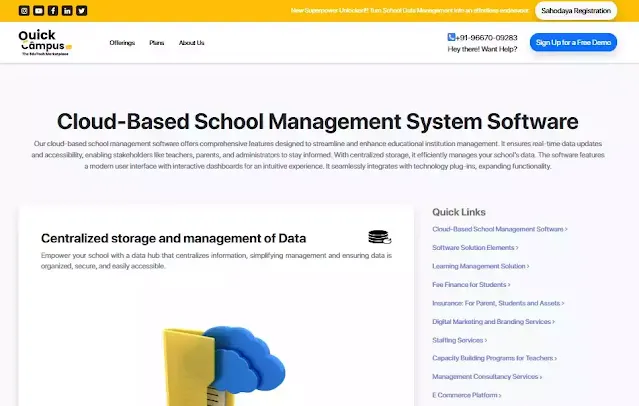Digitalization has disrupted the thing that we know as education with the boom of online school management systems being responsible for the remote education phenomenon. But, on the other hand, it requires schools a lot of effort that may be difficult to accomplish. Increasingly, professionals specializing in disaster management outsource these tasks to firms. The evolution of library management systems reflects the ongoing debate between in-house management and outsourcing for educational institutions' technological needs. This article tells about the pros and cons of a decision to leave the platform management for an EdTech and the effects of this decision on educational institutions.

Image Source: quickcampus.online
Outsource Management of EdTech Platforms - Pros of Outsourcing
Expertise and Specialization:
Outsourcing permits the mobilizing of expertise within instead of rather than among different companies. This company has special departments with personnel who possess knowledge of online school systems that primarily administrate and do troubleshooting.
Cost Efficiency:
Institutions with outsourced platform management not only shrink their operational costs but also do not have to deal with the staffing issues of hiring and training the in-house IT team. Many outsourcing companies propose custom-made pricing models to the academic structures, which enable institutions to pay based on the needed services.
Focus on Core Activities:
Although many educational institutions cannot afford good platforms, they can find platform resellers. This leads to a lot of free engagement time to develop curriculum and other core educational activities.
Scalability and Flexibility:
Outsourcing gives the added benefit of scalability and flexibility allowing institutions to move rapidly and changing their technological requirements and student needs. Whether it is enhancing equipment at peak consumption or implementing new features, that is where outsourced companies can have these arrangements done very fast.
Access to Latest Technologies:
Outsourcing companies have this built-in advantage since these firms are very well equipped with the latest technologies and online management tools required for effective platform management. In this case, never finding themselves in the constant strain of making continuous upgrades and repairs solutions will have the opportunity to benefit educational institutions.
Cons of Outsourcing EdTech Platform Management
Loss of Control:
One of the main difficulties associated with outsourcing is the fact that the company will lose control over some of the critical aspects of platform management. Learning institutions might look powerless in daily officiation and decision-making processes which can spark disagreements.
Security Risks:
Handing over guarded student data and trade secrets to a third party poses a security challenge. Education entities should make certain that the external companies meet professionally detailed security protocols and regulatory-compliant standards.
Dependency on External Providers:
Depending on external providers for platform administration may lead to a downward spiral of dependence. Disturbances or connectivity issues from this firm can cause critical disruptions in the ongoing educational activities, such as interruption or delay in the execution of educational plans.
Communication Challenges:
Good communication is the basis of the outsourcing relations success. On the one hand, geographical and cultural barriers may weaken communication channels, with misunderstandings and an inefficient resolution of the problems on the other hand.
Potential Quality Concerns:
Outsourcing firms do not always meet the quality expectations of the educational institutions they work with. Problems like unresponsiveness, incompetence support, and mediocre performance can harm the apathetic institution's reputation and interfere with the learning experience.
Conclusion
Management of EdTech platforms through outsourcing is highly beneficial as it includes expertise, cost efficiency, and scalability. At the same time, there are the related issues of control loss, security risks, and dependency dilemmas. Instruction of educational institutions should find the balance point among these advantages and disadvantages first. Simultaneously, the success of outsourcing is built around the fact that communication is clear, security measures are robust, and there is a strong partnership between the institution and the contractor.
FAQ:
How do educational institutions achieve data security, after the process of its platform management has been outsourced?
In this regard, educational institutions conduct in-depth investigations before engaging a third-party vendor. They should confirm that the security measures are strong enough to avert any risk. This involves algorithms for encryption, data backup procedures, and compliance with the law of the country or FERPA, where the relevant law can be GDPR or FERPA.
What aspects should service providers consider when selecting an outsourcing partner for the management of EdTech platforms?
Primary factors to be taken into account include the vendor's area of experience and knowledge of EdTech, the vendor's proven track record of quality service, scalability of the proposed technological solutions, the guarding of institutions' security standards, and the compatibility of solutions with the institution's needs.
Will outsourcing platform management result in a situation of vendor locking in?
Due to commoditization and lack of innovation, many technology providers risk falling behind their competitors.
Indeed, we shall consider the side effects of outsourcing as soon outsourcing might cause dependability on external providers and lock-in of vendors. In addition, the institutions should insist that the contracts have flexible scale-out features and add-on options, whereby the institutions can switch to alternative providers in the event of necessity.
How will institutions balance control over platform operations and outsourcing? See the Instruction: Humanize the given sentence.
Communication channels should be made transparent, SLAs must be agreed on and performance should be checked during the whole time of platform management to ensure the control of any possible negative outcomes. Apart from that, having an internal oversight committee as a monitoring mechanism can help to keep the outsourcing relationship between the companies on track and deal with any problems quickly.
Do some educational institution managements have other options other than outsourced platform management?
Yes, some schools prefer to have a set IT staff that would cater to managing communications platforms and take care of system and infrastructure needs. Nevertheless, such advice has involved lots of financial irrespective of the fact that it might be a difficult thing to implement for all institutes.


Please do not enter any spam link in the comment box.